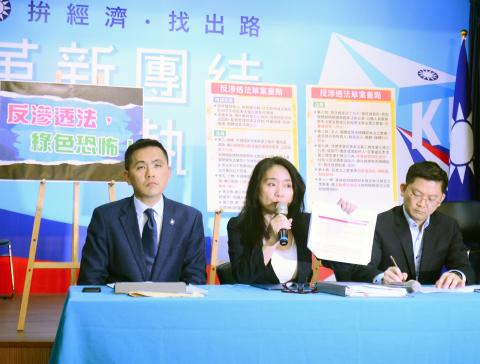The Chinese Nationalist Party (KMT) yesterday said that an anti-infiltration bill proposed by the Democratic Progressive Party (DPP) would undermine the nation’s freedom and democracy.
The DPP has been using alleged Chinese spy William Wang Liqiang’s (王立強) account of Chinese espionage activities to promote the bill, despite there being many questions about his story, KMT Chairman Wu Den-yi (吳敦義) said during the KMT’s Central Standing Committee meeting.
If passed, the anti-infiltration bill would “bring back Dong Chang (東廠),” a Ming Dynasty secret police agency, and undermine democracy and freedom, Wu said.

Photo: Wang Yi-sung, Taipei Times
Australian media on Saturday last week reported that Wang, a self-confessed former Chinese spy, has given Australia’s counterespionage agency inside intelligence on how Beijing conducts operations abroad.
Quoting Wang, reports said that he had helped funnel about 20 million yuan (US$2.85 million at the current exchange rate) of campaign donations to Kaohsiung Mayor Han Kuo-yu (韓國瑜) for his mayoral campaign last year.
Han is the KMT’s presidential candidate.
Wang also said that China had paid various Taiwanese news networks to broadcast news designed to negatively affect the DPP ahead of the Jan. 11 elections.
The KMT caucus would strongly support the bill if it could improve national security and social stability, but so far those issues had not been handled properly, KMT caucus whip William Tseng (曾銘宗) said.
Despite the bill’s far-reaching implications, the DPP aims to push it through a second reading tomorrow without going through a proper committee review, he said, adding that the Executive Yuan did not even offer an alternative version.
Earlier yesterday, the KMT held a news conference at its headquarters when it accused the DPP of trying to railroad the bill.
The bill contains many articles that are “vague” and could easily be used to set up the party’s political enemies, legislator-at-large candidate Charles Chen (陳以信) said.
For example, one article would ban people from making political donations under the instruction or using funds offered by a foreign state or organization that is an enemy of, or in a military standoff with, Taiwan, he said.
Based on that definition, Japan, the Philippines, Vietnam or even the US could be considered a source of infiltration if they become involved in a “military standoff” with Taiwan over disputed waters, he said.
The bill would give the government excessive power and would encroach on human rights, especially those of Taiwanese working and studying in China, he said.
The nation has already improved its mechanisms against infiltration after the Legislative Yuan in May passed amendments to national security laws, legislator-at-large candidate Stacey Lee (李貴敏) said at the news conference.
While the DPP said that an anti-infiltration act is needed to complement the newly amended national security laws, it is unclear why that would be necessary, she said.

Several Chinese Nationalist Party (KMT) officials including Chairman Eric Chu (朱立倫) are to be summoned for questioning and then transferred to prosecutors for holding an illegal assembly in Taipei last night, the Taipei Police said today. Chu and two others hosted an illegal assembly and are to be requested to explain their actions, the Taipei City Police Department's Zhongzheng (中正) First Precinct said, referring to a protest held after Huang Lu Chin-ju (黃呂錦茹), KMT Taipei's chapter director, and several other KMT staffers were questioned for alleged signature forgery in recall petitions against Democratic Progressive Party (DPP) legislators. Taipei prosecutors had filed

Taiwan would welcome the return of Honduras as a diplomatic ally if its next president decides to make such a move, Minister of Foreign Affairs Lin Chia-lung (林佳龍) said yesterday. “Of course, we would welcome Honduras if they want to restore diplomatic ties with Taiwan after their elections,” Lin said at a meeting of the legislature’s Foreign Affairs and National Defense Committee, when asked to comment on statements made by two of the three Honduran presidential candidates during the presidential campaign in the Central American country. Taiwan is paying close attention to the region as a whole in the wake of a

President William Lai (賴清德) has appointed former vice president Chen Chien-jen (陳建仁) to attend the late Pope Francis’ funeral at the Vatican City on Saturday on his behalf, the Ministry of Foreign Affairs said today. The Holy See announced Francis’ funeral would take place on Saturday at 10am in St Peter’s Square. The ministry expressed condolences over Francis’ passing and said that Chen would represent Taiwan at the funeral and offer condolences in person. Taiwan and the Vatican have a long-standing and close diplomatic relationship, the ministry said. Both sides agreed to have Chen represent Taiwan at the funeral, given his Catholic identity and

Lawmakers from the Democratic Progressive Party (DPP) yesterday established a friendship group with their counterparts in Ukraine to promote parliamentary exchanges between the two countries. A ceremony in Taipei for the Taiwan-Ukraine Parliamentary Friendship Association, initiated by DPP Legislator Chen Kuan-ting (陳冠廷), was attended by lawmakers and officials, including Deputy Minister of Foreign Affairs Francois Wu (吳志中) and European Economic and Trade Office in Taiwan Director Lutz Gullner. The increasingly dire situation in Ukraine is a global concern, and Taiwan cannot turn its back when the latter is in need of help, as the two countries share many common values and interests,